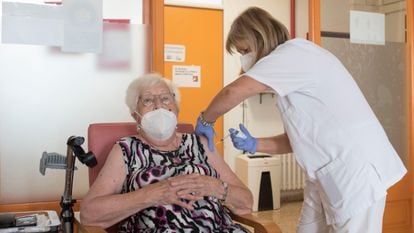Spain to administer third Covid-19 vaccine dose to over-70s
The Public Health Commission has decided to allow booster shots of the Pfizer-BioNTech and Moderna medication starting October 25
/cloudfront-eu-central-1.images.arcpublishing.com/prisa/BF6Z3KC3BSGYZFYNP6M4EVHPH4.jpg)
Starting October 25, Spain will begin administering a third dose of the Covid-19 vaccines developed by Pfizer-BioNTech and Moderna to the over-70 population. The decision was reached on Tuesday by Spain’s Public Health Commission, which is made up of the Health Ministry and representatives from the regions.
The agreement came one day after the European Union’s drug regulator, the European Medicines Agency (EMA), opened the door for a third shot of the Pfizer vaccine to be administered to the adult population. The EMA, however, indicated that there is still little evidence of the effectiveness of booster shots among people with normal immune systems. With respect to a third dose of the Moderna vaccine, the regulator has not yet made a decision, although it is likely to do so in the coming days. The EMA also stated in its decision on Monday that an extra dose of the Pfizer and Moderna vaccines could be given to people with severely weakened immune systems – a step Spain, and several other EU countries, have already taken.
The Public Health Commission’s agreement means that the administration of third doses among the over-70 population will coincide with the flu vaccination drive. In accordance with the EMA’s guidelines announced on Monday, this booster Covid-19 shot will be given six months after the second. According to sources present at Tuesday’s meeting, the Public Health Commission’s decision to administer third shots to over-70s was backed by 12 of Spain’s 17 regions, which are in charge of their healthcare systems, vaccination drives and coronavirus restrictions. Madrid and Galicia voted against the measure, while five abstained.
In Spain, 6.8 million people in the over-70 population have so far been fully vaccinated against Covid-19. The large majority of this age group received the Pfizer vaccine, although some were vaccinated with Moderna. This is due to the fact that when Spain began immunizing the over-70s at the beginning of the year, very few Moderna vaccines had been delivered. A small number of this age group were also vaccinated with the single-dose Janssen vaccine. This group will not be affected by the Public Health Commission’s decision as the EMA does not yet have a position on possible booster shots from Janssen.
The Health Ministry explained in a press release that “the goal [of the third doses] is to increase the protection of the most vulnerable people,” stating that “the scientific evidence has shown that age is the main risk factor” with respect to the coronavirus.
The decision to administer a third vaccine dose to the over-70 population has followed a similar process to the decision to allow booster shots for people with severely depressed immune systems. In that instance, like now, the Public Health Commission waited for the EMA to first reach a position on the matter, which it did on September 6.
A day later, the Public Health Commission approved third doses for some 100,000 people with weakened immune systems, including organ transplant recipients (some 60,000 people), bone marrow transplant recipients (20,000), and patients being treated with anti-CD20 drugs. This group was later widened to include people who are undergoing dialysis treatment, cancer patients, the over-40s with Down syndrome and seniors who live in care homes.

In their eagerness to leave the worst of the pandemic behind, drug regulators and public authorities are taking decisions almost immediately as new data or evidence emerges, sometimes in advance.
The EMA press release issued on Monday opened the door for allowing a third dose for the over-70 age group, while admitting that there is still little evidence on the effectiveness of booster shots. To support its decision, the agency argued that the data showed that “a rise in antibody levels” was observed in people who had received a third dose.
Experts, however, say that a fall in antibodies does not necessarily mean that a person cannot defend themselves against the coronavirus, given that the immune system is able to produce antibodies again if it comes into contact with the virus. The EMA also warned that it also still has little information about the safety of third doses.
From the perspective of the immunologists, there is no evidence of a generalized need for a third doseImmunology professor África González
África González, a professor of immunology at the Biomedical Research Center (CINBIO), said that the EMA’s decision is “reasonably based on the data presented.” It will now be up to each EU country to decide what to do according to its incidence rate, vaccination coverage and other factors.
But according to González, the EMA “does not defend this third dose as something that should be done massively,” but rather a measure that should be applied in specific cases and adapted to the vaccination strategy of each country, as the Public Health Commission has done. “From the perspective of the immunologists, there is no evidence of a generalized need for a third dose,” said González.
In Spain, coronavirus infection rates continue to fall. According to the latest figures, released Tuesday evening, the 14-day cumulative number of cases per 100,000 inhabitants has dropped to 52, down from 54.12 on Monday. This means that Spain is just two percentage points away from entering a low-risk situation, as defined by the coronavirus alert system. Pressure on intensive care units (ICUs) also fell on Tuesday, with Covid-19 patients occupying 6.61% of ICU beds, down from 6.99% on Monday.
/cloudfront-eu-central-1.images.arcpublishing.com/prisa/XRYSBLKEU5CWZIYGXTDXN5F2V4.jpg)
/cloudfront-eu-central-1.images.arcpublishing.com/prisa/2R4U5CB5HLI2SOSPB6N2WG5V2E.jpg)










































